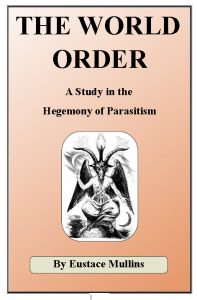When he was proffered the cup of hemlock by his fellow-citizens, Socretes, last words were, “Crito, I owe a cock to Asclepius; will you remember to pay the debt?”
A gentleman is responsible for his obligations, and this book is the repayment of the efforts of three great men who chose me as their protege – Ezra Pound, the dominant literary figure of our time; George Stimpson, the most respected journalist in Washington (the title has been vacant since his death); and H.L. Hunt, whose spectacular business success blinded the public to his brilliant philosophical achievements. It was H.L. Hunt who invented the term “The Mistaken” for the self-corrupted members of the new class who now control our world – he might have added that they could also be described as “The Misshapen”, because of their warped and perverted sense of values.
The present work is also an expression of another Greek attitude – gratitude for life. Michael Lekakis introduced this astounding Greek attribute to me some thirty years ago. I describe it as “astounding”, because no one today thinks of being grateful for life. Who can conceive of “gratitude for life” in an existence of eternal and worldwide slavery imposed upon humanity by the minions of the World Order?
In “The Greek Way”, Edith Hamilton says, “Tragedy was a Greek creation because in Greece thought was free.” We do not have tragedy today because of the thought control imposed by the World Order. Instead, we have “Newspeak” and “doublethink” in the world of 1989. I was privileged to sit in on a number conversations between Edith Hamilton and Ezra Pound, in which the conversation was uninhibited and far-reaching – freedom of thought in a federal institution in which one of the talkers was held as a political prisoner! Pound describes these talks in “The Cantos”, “And they want to know what we talked about? ‘de litteris et de armis, praestantibusque ingeniis.” Nietzsche also discoursed on “tragic pleasure”, which no longer exists, because the World Order, in its anxiety to maintain control of every aspect of our lives, has banned passion. As a poor substitute, it gives us drugs and degeneracy.
There are many facts in this book which you, the reader, will not wish to accept. I ask you to accept nothing, but to make your own investigations. You may find even more astonishing true facts than I have managed to glean in thirty-five years of intensive and in-depth research. Finally, we have Edith Hamilton’s rendering of Socrates, most notable admonition, “Agree with me if I seem to you to speak the truth; or, if not, withstand me might and main that I may not deceive you as well as myself in my desire, and like the bee leave my sting in you before I die. And now let us proceed.”
